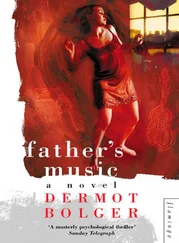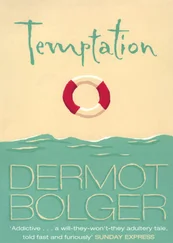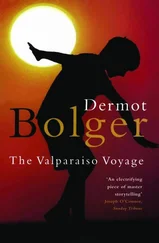Dermot Bolger - The Woman’s Daughter
Здесь есть возможность читать онлайн «Dermot Bolger - The Woman’s Daughter» — ознакомительный отрывок электронной книги совершенно бесплатно, а после прочтения отрывка купить полную версию. В некоторых случаях можно слушать аудио, скачать через торрент в формате fb2 и присутствует краткое содержание. Жанр: unrecognised, на английском языке. Описание произведения, (предисловие) а так же отзывы посетителей доступны на портале библиотеки ЛибКат.
- Название:The Woman’s Daughter
- Автор:
- Жанр:
- Год:неизвестен
- ISBN:нет данных
- Рейтинг книги:4 / 5. Голосов: 1
-
Избранное:Добавить в избранное
- Отзывы:
-
Ваша оценка:
- 80
- 1
- 2
- 3
- 4
- 5
The Woman’s Daughter: краткое содержание, описание и аннотация
Предлагаем к чтению аннотацию, описание, краткое содержание или предисловие (зависит от того, что написал сам автор книги «The Woman’s Daughter»). Если вы не нашли необходимую информацию о книге — напишите в комментариях, мы постараемся отыскать её.
The Woman’s Daughter — читать онлайн ознакомительный отрывок
Ниже представлен текст книги, разбитый по страницам. Система сохранения места последней прочитанной страницы, позволяет с удобством читать онлайн бесплатно книгу «The Woman’s Daughter», без необходимости каждый раз заново искать на чём Вы остановились. Поставьте закладку, и сможете в любой момент перейти на страницу, на которой закончили чтение.
Интервал:
Закладка:
Below the window we could see the stream, but not set in a park like it is now. There were big tangles of bushes and old trees down there, and you could watch it disappear into the meadow that was walled in by the convent. Sometimes after dinner on Sundays, Mammy would cajole Daddy to walk with us down Washerwoman’s Hill to the Botanic Gardens. There’d be rows of black bicycles parked outside and crowds walking along the bright avenues of flowers. And the first place we’d always visit would be the huge glasshouses, all dripping wet in the steeping heat with tropical plants reaching up to the sky and water lilies in bloom on the walled pond. But I’d grow impatient and I’d tug at her hand, and drag her out past the sign beside the door forbidding perambulators.
They’d laugh at my haste as I pulled them along, through the old trees and grasses where nobody else went until I came to the wall with the convent. There we could see it again, brown now and sluggish, flowing out of that silent valley where nuns walked. Johnny and I would drop petals in it and walk along, following their progress till it came to a turn where the water banked steeply with a wild spray of foam down a waterfall and sped away. We’d race across the bridge, trying to keep up as the petals bobbed and spun in a white tide, but we could never catch them as they spun away, past the rose garden to escape down through Drumcondra. And every night when Johnny and I lay together in bed, we’d invent all sorts of plans for the future.
Do you know the one dream we always both had? What we both said we’d do when we were big enough? One morning we would set out off up the country and find where the stream first rose from the earth, and then we’d walk every step of its path, down Watery Lane and across the North Road, through the village and down the steep valley through the woods, then past our house and we’d wade into the convent grounds, through the Botanic Gardens and go on down by the parks and the factories, and on and on until we finally came to where it entered the sea. And there we’d stand together like those explorers in that film in the Casino who’d discovered the source of the Nile.
There is a legend of the dead, unboxed and unaccounted for: the story of a hunger spreading across a land. Small cabins caving in and skeletons in rags crawling through the woodland to beg alms from horsemen galloping towards the walled houses beyond Shallon. The year they stripped the carvings from the walls of the ancient reformed church, where the stench of the dead in the crypts beneath the flagstones had begun to sicken their descendants kneeling at prayer. Past the unmarked plot where the cross lay buried since Cromwell, by the gates of Dr Harty’s asylum at Farnham where twenty-two opulent incurables ranted, and through the small lane at the rear of the tavern, the chiselled marble carried in procession towards a newly consecrated home.
There are stories with nobody left to remember: of smallpox and cholera secreted in the breath of children panting from mud-hut to famished hovel, and of the headland where two streams met at the forest edge where each evening they laid them hastily, unnumbered and still warm in the open pit outside the forked railings of the cemetery.
There are legends of lights leading to nowhere, of hungers in isolated places that could waste a person. There are spikes and concrete foundations, cables twisting through the vaults beneath floorboards. There are skulls of children smiling upward.
At a quarter to nine every morning, Kitty Murphy would call for me and we would walk together to school. There was a steep bank beside the school wall and a bush that we loved to climb through. Then we’d walk primly up the steps where Sister Carmel was watching in the yard. We were in the middle one of the three classrooms lit by high, narrow windows that could only be opened by pulling long cords. There was a stove in the corner to keep us warm and two quivering tubs of ink in each desk. You’ll never know what I saved you from by never letting them get at you.
Each morning I would be hauled up and Sister Carmel would ask me my name. I’d stand in that space in front of the desks where the floorboards glistened with polish and swallow once or twice before I’d say, ‘Sandra, Sister.’ She’d grab my hand screaming, ‘What sort of a mother have you at all!’ and I’d feel the pain shoot up my arm like an electric shock. Twice the thin cane would flash and she’d shout, ‘What class of a mother gave you a pagan name?’ as my other wrist was clenched by her fingers. My hand would not open and the cane cracked against the white knuckles.
‘Your name is Brigid, after our saint. Now what is your name?’ And all I could think of was that woman waiting for me at home, of how I could hug her in the hall when I escaped from here, and I could never utter the foreign name they wanted. I’d stand silently with the palms of my hands buried under my armpits and the tears streaking down my face as I watched that old, puckered face in the habit staring down at me.
‘We’ll make you a Christian yet, no girl here will have a pagan name!’ Then the cane would dart across my bare legs as I jumped back against the wooden desk and she’d prompt the class to take up the steadily rising chant, ‘Brigid, Brigid, your name is Brigid!’ All the smug Claires and Marys and Teresas, thankful for the diversion and glad that it wasn’t them. And when I finally said, ‘Brigid, my name is Brigid,’ I knew it was a betrayal of the woman I loved.
At three o’clock the bell would ring and we’d burst out screaming through the gates. The girls would gang up, chanting ‘Frigid Brigid! Frigid Brigid!’ and follow me and Kitty Murphy to the end of our street. I’d bang on the knocker and throw my arms around her waist, crying with my face buried in her dress, and she’d hug me and cup my face in her hands, smiling as she said, ‘What’s wrong, Sandra? Were you bad at spelling? Were you bad at sums?’
But what could I say to her? How could I tell her the name she gave me was wrong? So I’d just climb into her lap and clutch her and cry until finally she would grow cross. ‘We never had any secrets before,’ she’d say, lifting me down from her lap.
I’d set the tea things out on the oilcloth on the kitchen table and my father would come in and wash up after work. They called him The Doctor there because he arrived into the factory each morning in a suit with his lunch in a leather bag and changed into his overalls in the toilets. Johnny always seemed to have a fresh cut or bruise that he’d picked up after school, fighting in the Cabra Wars. Then, still clutching a bit of bread and butter and banana in our hands, the pair of us would rush out into the street and run screeching between the lamp-posts to play Statues or Relievio or Hide-and-Seek.
I’d stand on the wall with my face pressed against the telegraph pole and count up to thirty before spinning around to scan the dark gardens with their big rucks of hedges and walls to make out the shapes of the hidden figures.
And with my skin tingling with excitement and my breath clouding with the cold I’d forget everything except those friends dodging in and out of the shadows till morning came again and Kitty Murphy knocked to accompany me on another slow journey of fear. What would they have done to you? How could they have understood? Whatever else I’ve taken from you, daughter, at least I’ve spared you that.
Climb over the gate below the row of old labourers’ cottages on the slope of the hill. Drop down on to the grass where the horse’s hooves have left their mark. See the mare snort and quiver as she watches you approach. Two girls advancing hand in hand towards the nervous animal who turns as they dart forward with sunlight minting silver from her hooves and gallops towards the laneway that runs above the dairy where the old man is watching.
Читать дальшеИнтервал:
Закладка:
Похожие книги на «The Woman’s Daughter»
Представляем Вашему вниманию похожие книги на «The Woman’s Daughter» списком для выбора. Мы отобрали схожую по названию и смыслу литературу в надежде предоставить читателям больше вариантов отыскать новые, интересные, ещё непрочитанные произведения.
Обсуждение, отзывы о книге «The Woman’s Daughter» и просто собственные мнения читателей. Оставьте ваши комментарии, напишите, что Вы думаете о произведении, его смысле или главных героях. Укажите что конкретно понравилось, а что нет, и почему Вы так считаете.












